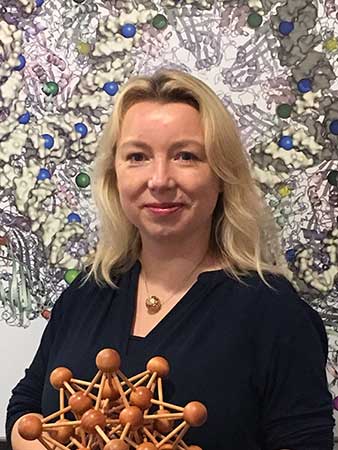Professor will explore the mysteries – and mathematics – of the viral universe during Lakehead’s R and I Week
March 2, 2022 – Orillia and Thunder Bay, Ont.
Can mathematics help us design anti-viral medications or even repurpose viruses for genetic therapies?
On Monday, March 7 at 7 pm, Dr. Reidun Twarock, a professor of mathematical virology at the University of York in the UK, will present “Viral Disease through the Lens of Geometry” via Zoom, during Lakehead University’s Research and Innovation Week.
This talk is hosted by Lakehead’s Faculty of Science and Environmental Studies as part of its Science Speaker Series.
Dr. Twarock will discuss gaining new perspectives through mathematical modelling on how viruses assemble, evolve, and infect their hosts.

“I will start off by introducing viral symmetry, inviting people on a journey into the ‘virosphere’ – the viral universe,” she said. “Although viruses can be very different from one another, they follow a few common rules. Once you put your finger on them, you have a lot of power over viruses.”
Mathematics can predict the lattice structures of viruses, and knowledge of those symmetries can be used to fight the viruses. Dr. Twarock will also show how this technique can be used to discover ways to use the virus as a shell for delivering genetic therapies – a type of bio nanotechnology.
Dr. Twarock said one characteristic that makes viruses successful is their ability to code for the protein components of the virus as well as how to efficiently put the virus together.
It’s sort of like IKEA furniture with the pieces and the instructions all contained in one small bundle. Once you understand the geometry involved in the rules governing virus assembly, you can then stop or modify the viruses.
“It’s finding the Achilles’ heel of the virus, if you wish, through the lens of mathematics – finding the rules of how viruses work,” she said.
“You can find ways of breaking their assembly.” Given that there may be millions or even trillions of different viruses, finding a shortcut to decode them all would be invaluable to fighting the dangerous ones.
The opportunities to use viral protein containers in nanomedicine as delivery vehicles are especially exciting.
“We can turn the tables to use viral containers to deliver therapeutic cargos,” Dr. Twarock said.
For example, you could use the shell of a hepatitis virus, which is efficient at entering liver cells, to fight liver cancer. You could replace the hepatitis genome inside the shell with genetic material engineered to repair liver cancer cells.
Dr. Twarock said that the modelling they are working on now won’t directly help against the coronavirus, which is bigger and more complex. But it could provide a Rosetta Stone of sorts.
“COVID-19 has a very large genome, so it applies a different genome packaging strategy. But the principles are similar, so you can get insights by analogy that you would not have otherwise.”
Dr. Twarock originally worked in quantum physics. She switched to viruses when she saw the similarities between the two systems.
“There are some similarities with strong mathematical links, especially with regards to symmetries. Then I saw that knowing about symmetries is almost like a secret weapon against viruses. You can visualize and understand mechanisms that you would not be able to see unless you use the mathematical microscope. It is so fascinating.”
For more information and (free) registration visit lakeheadu.ca/ri.
– 30 –
Media: For more information or interviews, please contact Brandon Walker, Media, Communications and Marketing Associate, at (807) 343-8110 ext. 8372 or mediarelations@lakeheadu.ca.
Lakehead University is a fully comprehensive university with approximately 9,700 full-time equivalent students and over 2,000 faculty and staff at two campuses in Orillia and Thunder Bay, Ontario. Lakehead has 10 faculties, including Business Administration, Education, Engineering, Graduate Studies, Health & Behavioural Sciences, Law, Natural Resources Management, the Northern Ontario School of Medicine, Science & Environmental Studies, and Social Sciences & Humanities. Lakehead University’s achievements have been recognized nationally and internationally, including being ranked, once again, among Canada’s Top 10 primarily undergraduate universities in Maclean’s 2021 University Rankings; as well as included in the top half of Times Higher Education's 2022 World Universities Rankings for the third consecutive year, and in the top 100 of 1,115 universities from around the world in THE's 2021 Impact Rankings (which assesses institutions against the United Nations’ 17 Sustainable Development Goals). Visit www.lakeheadu.ca.

